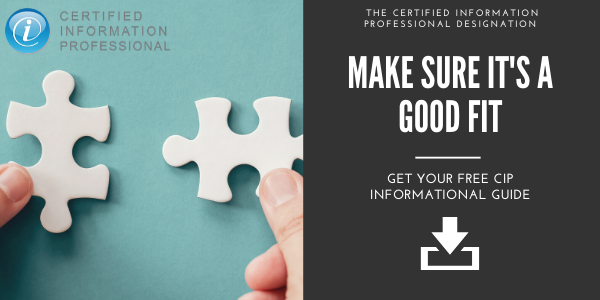
CIP Redux
Certified Information Professional (CIP)
Please accept our thanks for all of the comments around the future of the CIP. They have been gratifying in what they reveal about the passion that people feel for AIIM. This is a terrific thing and a trust we do not take lightly.
When the Board meets, they try to imagine the entire membership sitting around the table and make decisions accordingly. Sometimes those decisions need reexamination and modification, and the Board has done that.
In the struggle to make ends meet — and keeping any non-profit viable is no easy feat these days — it’s easy to forget that passion is the underlying force that keeps any association alive. Given this, we would like to outline as simply as possible a path to retain and grow the CIP and outline a path forward.
The AIIM training program represents an extremely wide net of information competencies; much wider than we originally anticipated when we launched the first two courses. The range of competencies covered by AIIM’s training program now includes content management, records management, information governance, business process management, taxonomies, metadata, capture, SharePoint governance, content analytics, and all of the underlying technologies that support these broad areas. A “Master” is one who has a deep dive understanding of one particular competency. A CIP is one who has a broad grasp of all of these technologies. Both are important.
The CIP was intended to cover a broad set of information management technologies — broader than our two training courses at the time. The original body of knowledge for the CIP was defined separately from that of our training program, never fully realizing at the time how expansive our own content and information management training would become. The lack of linkage between the two bodies of knowledge created a virtually impossible task in keeping both up to date and current in an era of rapidly changing technologies.
Given the above, we will proceed as follows:
- We will continue the CIP and begin work on CIP 2.0.
- For CIP 2.0, we will redefine its body of knowledge as the full body of knowledge represented across all of AIIM's training courses.
- We will launch CIP 2.0 at AIIM16.
Thanks again for all of the passion for AIIM. If there are any comments or questions or confusion about your particular situation regarding the CIP (I know the past week has been confusing), please direct them specifically to me (johnmancini [at] aiim.org) and I will get them answered.
We look forward to celebrating the accomplishments of all of our Masters and CIPs at AIIM16, and we hope to see you there. Happy Holidays.
About John Mancini
John Mancini is the President of Content Results, LLC and the Past President of AIIM. He is a well-known author, speaker, and advisor on information management, digital transformation and intelligent automation. John is a frequent keynote speaker and author of more than 30 eBooks on a variety of topics. He can be found on Twitter, LinkedIn and Facebook as jmancini77. Recent keynote topics include: The Stairway to Digital Transformation Navigating Disruptive Waters — 4 Things You Need to Know to Build Your Digital Transformation Strategy Getting Ahead of the Digital Transformation Curve Viewing Information Management Through a New Lens Digital Disruption: 6 Strategies to Avoid Being “Blockbustered” Specialties: Keynote speaker and writer on AI, RPA, intelligent Information Management, Intelligent Automation and Digital Transformation. Consensus-building with Boards to create strategic focus, action, and accountability. Extensive public speaking and public relations work Conversant and experienced in major technology issues and trends. Expert on inbound and content marketing, particularly in an association environment and on the Hubspot platform. John is a Phi Beta Kappa graduate of the College of William and Mary, and holds an M.A. in Public Policy from the Woodrow Wilson School at Princeton University.


![[Informational Guide] Is certification right for you? Get this free CIP Exam Guide to find out.](https://no-cache.hubspot.com/cta/default/332414/dcb32a30-373b-4f1b-9d7f-90425213921c.png)
